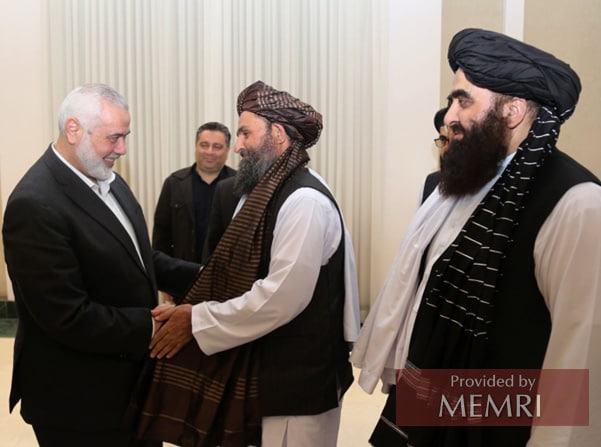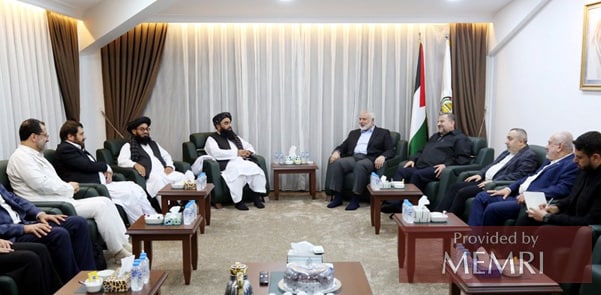A recent meeting between Hamas leader Ismail Haniyeh and Afghan Taliban leaders in Tehran has turned the spotlight on Hamas-Taliban relations, facilitated by Iran, Qatar, and Turkey, and driven by the shared ideology of jihad. On May 23, 2024, Hafiz Zia Ahmad, the deputy spokesman for the Taliban's foreign affairs ministry, tweeted that Ismail Haniyeh met with Mullah Abdul Ghani Baradar and Amir Khan Muttaqi, respectively the deputy prime minister and the foreign minister of the Taliban, in Tehran.[1]
According to a media report, a meeting also took place between Ismail Haniyeh and Ayatollah Ali Khamenei, the supreme leader of Iran. During the meeting, Khamanei cited a Quran 2:249, which mentions "How a small group defeated a large group, by Allah's will" and noted that a small group of the Taliban mujahideen defeated the military might of the U.S. and NATO in Afghanistan.[2] It seems the Taliban leaders were present during the meeting with Khamenei,[3] and they also met with Sheikh Tamim ibn Hamad Al Thani, the Emir of Qatar, in Tehran.[4]
Three countries are central to facilitating the Hamas-Taliban relations: Qatar, Turkey, and Iran. Officials travel between these countries frequently for bilateral and multilateral reasons, and also forge connections between Afghan Taliban and the Hamas leadership. Qatar's Deputy Foreign Affairs Minister Mohammad bin Abdulaziz Al-Khulifi was visiting Kabul in May 2024,[5] while a Taliban delegation was headed for Turkey,[6] even as a Turkish delegation led by Attila Toros, the head of the Migration Agency, was already in Kabul.[7]
Such meetings are not limited to bilateral issues involving the Taliban-ruled Afghanistan. According to a Pashtu-language statement by the Afghan Taliban's Foreign Ministry on May 24, Foreign Minister Mawlawi Amir Khan Muttaqi, during his meeting with Qatar's Deputy Foreign Affairs Minister Mohammad bin Abdulaziz Al-Khulifi, lauded Qatar's position on the Gaza conflict.[8]

Ismail Haniyeh meets with Afghan Taliban leaders in Tehran on May 22, 2024.
Soon after the Islamic Emirate of Afghanistan (the Afghan Taliban jihadi organization) took control of Afghanistan on August 15, 2021, Hamas leader Ismail Haniyeh conveyed his greetings to the Afghan Taliban. On August 16, just a day after the Taliban seized power, Ismail Haniyeh telephoned Taliban leader Abdul Ghani Baradar, saying that the end of American occupation "is a prelude to the demise of all occupation forces, foremost of which is the Israeli occupation of Palestine."[9] On his part, Abdul Ghani Baradar, now the Taliban's Deputy Prime Minister for Economic Affairs, expressed hope for Palestinian "victory and empowerment as a result of their resistance" and called on all nations to support Palestine.[10]
On the same day, August 16, Hamas issued an announcement congratulating the "Muslim Afghan people" on "the expulsion of the American occupation from all the Afghan lands" and also greeting "the Taliban movement and its courageous leadership" for "the victory that is the jewel in the crown of the ongoing jihad it has waged for the past 20 years."[11] Any inference that the Hamas-Taliban relations developed after the Taliban's victory over U.S. forces is incorrect. On the day the Taliban took Kabul, Gaza-based Hamas-affiliated journalists tweeted photos of the Hamas leaders meeting with the Taliban, apparently in the Qatari capital Doha, immediately after the May 2021 Gaza-Israel conflict.[12]
After the Taliban's victory, senior Hamas official Mahmoud Al-Zahhar was interviewed on Al-Aqsa TV of Hamas. Mahmoud Al-Zahhar described the Taliban victory as the "expulsion" of the American occupation and warned that the leaders of the Gulf who normalized relations with Israel will soon flee their countries like Prime Minister Zine El-Abidine Ben Ali fled Tunisia and President Ashraf Ghani fled Afghanistan.[13]
Mahmoud Al-Zahhar stated: "Afghanistan expelled the U.S. from its territory, thus legitimizing the expulsion of the occupation. This means that what Hamas is doing here to expel the [Israeli] occupation is legitimate. If the world accepted it [in Afghanistan], why shouldn't it be accepted with regard to Gaza?"[14]

Afghan Taliban leaders meet with Ismail Haniyeh in Qatar sometime around May 2021.
According to a report carried by Turkey's state-run Anadolu Agency, in early October 2021, a few weeks after the Islamic Emirate's ride to power, Ismail Haniyeh spoke on the phone with the Taliban's Foreign Affairs Minister Amir Khan Muttaqi and greeted the jihadi group on their "victory over U.S. occupation forces in Afghanistan."[15]
Ismail Haniyeh said that he was hopeful that the Taliban movement "could have a role in supporting their brothers in Palestine to liberate Jerusalem."[16] He also stressed the need to keep "Palestine present in the speeches of the Afghan Foreign Ministry, especially Jerusalem and the ongoing (Israeli) violations there."[17] According to the report, Amir Khan Muttaqi shared similar sentiments, expressing "his pride in the struggle of the Palestinian people and their steadfastness in Jerusalem."[18]
In late-October 2022, Afghan Taliban spokesman Zabihullah Mujahid travelled to Turkey, where he met with Ismail Haniyeh and other Hamas leader, as seen in a photo of the meeting.[19] According to a tweet of Mujahid, the Taliban delegation members said during the meeting that the issue of Palestine and Al-Aqsa Mosque was "a problem of the whole Ummah."[20] Zabihullah Mujahid and his delegation was visiting Turkey for a week of meetings with the Islamic religious scholars and with Afghan expatriate businessmen.[21]
Commenting on the face-to-face meeting between Zabihullah Mujahid and Ismail Haniyeh, Afghan academic Haroun Rahimi said that both could be seeking to connect Palestine and Afghanistan "as two occupied territories" aiming to capitalize on "the anti-imperialist and anti-western sentiment amongst Muslims as a way to put pressure on other Muslim leaders."[22] Rahimi added: "The Taliban also saw Afghanistan as being occupied by western powers, and would like to portray themselves as the freedom fighters who have freed the country from American imperialism."[23]

Afghan Taliban spokesman Zabihullah Mujahid with meets Ismail Haniyeh and other Hamas leaders in Turkey in October 2022.
The Afghan Taliban view their country's history in terms of three historical phases of jihad against Great Britain, the erstwhile Soviet Union, and the United States, and as inspiring resistance movements across the world, including in the Balkans, the Middle East, Kashmir and Pakistan, the Caucasus, and the Far East. This view is also shared by Hamas leaders, who praise the Taliban's jihad as a source of inspiration.
It is in this context of the history of jihad that the Hamas-Taliban relations flourish, even though the Taliban, sometimes posing as a nationalist group whose aims are limited to Afghanistan, have said at least once that they have no problem with Israel.[24] Hamas and its ideological leaders certainly view the Taliban's success against the American military might as a path they should follow against Israel.
Yousuf Rizqa, formerly information minister of Hamas in Gaza and an advisor to Ismail Haniyeh, wrote: "The lesson we can learn from the Taliban... is that resistance always defeats the occupier."[25] Dr. Mustafa Yusuf Al-Lidawi, former Hamas representative in Syria and Iran, said of the Taliban victory: "It is not unreasonable [to assume] that Afghanistan will become a new base of operations for Hamas... whose gains will multiply as a result the Taliban rule there, for Hamas [leaders] met with the Taliban leadership for years during their joint stay in Qatar."[26]
* Tufail Ahmad is Senior Fellow for the MEMRI Islamism and Counter-Radicalization Initiative.
[1] X.com/HafizZiaAhmad, May 23, 2024.
[2] Africanews.com, May 23, 2024.
[3] Africanews.com, May 23, 2024.
[4] Afintl.com, May 23, 2024.
[5] AlemarahEnglish.af (Afghanistan), May 24, 2024.
[6] AlemarahEnglish.af (Afghanistan), May 24, 2024.
[7] AlemarahEnglish.af (Afghanistan), May 23, 2024.
[8] X.com/HafizZiaAhmad, May 24, 2024.
[9] AA.com (Turkey), August 18, 2021.
[10] AA.com (Turkey), August 18, 2021.
[11] MEMRI Special Dispatches Series No. 9505, Qatar's Protégés – Hamas Officials, Muslim Brotherhood, Al-Jazeera Reporters – Praise Taliban's 'Jihad' And 'Victory'; Journalists, Liberals In Response: They Should Move To Kabul, August 19, 2021.
[12] MEMRI Special Dispatches Series No. 9505, Qatar's Protégés – Hamas Officials, Muslim Brotherhood, Al-Jazeera Reporters – Praise Taliban's 'Jihad' And 'Victory'; Journalists, Liberals In Response: They Should Move To Kabul, August 19, 2021.
[13] MEMRI TV Clip No. 9052, Senior Hamas Official Mahmoud Al-Zahhar: The World Will Accept The Expulsion Of Israel, Like It Accepted The Expulsion Of The U.S. By The Taliban; Gulf Leaders Will Be Forced To Flee Like Ashraf Ghani, August 19, 2021.
[14] MEMRI TV Clip No. 9052, Senior Hamas Official Mahmoud Al-Zahhar: The World Will Accept The Expulsion Of Israel, Like It Accepted The Expulsion Of The U.S. By The Taliban; Gulf Leaders Will Be Forced To Flee Like Ashraf Ghani, August 19, 2021.
[15] AA.com (Turkey), October 3, 2021.
[16] AA.com (Turkey), October 3, 2021.
[17] AA.com (Turkey), October 3, 2021.
[18] AA.com (Turkey), October 3, 2021.
[19] X.com/Zabehulah_M33, October 26, 2022.
[20] X.com/Zabehulah_M33, October 26, 2022.
[21] Middleeasteye.net, October 28, 2022.
[22] Middleeasteye.net, October 28, 2022.
[23] Middleeasteye.net, October 28, 2022.
[24] MEMRI TV Clip No. 9793, In Al-Jazeera Interview, Taliban Spokesman Dr. Muhammad Naeem Wardak Refuses To Rule Out Relations With Israel: What Problem Do We Have With Israel? It Is Strange To Ask Me About Issues That Have Nothing To Do With Us, August 31, 2022.
[25] MEMRI Special Dispatches Series No. 9525, Hamas Journalists, Former Officials Discuss Lessons Of Taliban Victory: Uncompromising Resistance Is Only Way To Expel Occupiers, August 31, 2021.
[26] MEMRI Special Dispatches Series No. 9525, Hamas Journalists, Former Officials Discuss Lessons Of Taliban Victory: Uncompromising Resistance Is Only Way To Expel Occupiers, August 31, 2021.




